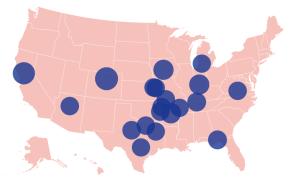Everything you need to know about renter’s insurance
Dwellsy is a Cashay content contributor. It’s also an apartment-listing site that provides easy-to-use tools to find, sort, and share the homes you like.
You’re excited about your new place. You’re picking out furniture, talking to your friends about the great things to do nearby, and figuring out how close you’re going to be to all of them, and of course, you’re thinking about renter’s insurance, right?
Well...probably not, but you should.
Why? It’s often required by landlords. Some will even force an insurance policy on you if you don’t buy your own.

Here at Dwellsy, we know about renting and we think that renter’s insurance is a pretty good deal for most renters if you know what to look for.
Let’s start with what it is.
The goal of renter’s insurance is that if something bad happens in your place, you have insurance to cover it and get your stuff back with minimal cost to you.
But, you need to know the details and pick the right kind for you. To start, there are two types of renter’s insurance.
One is called liability-only insurance, and that’s just covering your landlord’s property, in case you damaged it. Accidentally leave the faucet running and cause a flood? The landlord’s floor, walls, and appliances are covered, but not your stuff. Your laptop that was on the floor? Your problem. Your vintage shag rug? Ruined.
Let’s be clear — the landlord could also file a claim against you in this situation, so that liability insurance does give you protection in this type of situation, but it’s mostly protecting the landlord.
What if you want your stuff covered, too?
You’re in luck. There’s another type of renter’s insurance — personal property insurance — often called HO-4 insurance. This is the good stuff, in our opinion.
HO-4 policies almost always include liability coverage. But, the HO-4 policy also covers you and your stuff. Using the flood as an example, you would have coverage for your laptop and more.
How much coverage depends on your renter’s insurance policy — it could be up to $5,000, $20,000, or more. And it may even cover your stuff if you lose it when you’re not home. Say your iPad gets stolen when you turn your head at your favorite bar? It might be insured!

We know you’re not going to read the insurance policy (no one ever does!), but you should talk to an agent to make sure you understand it. Oftentimes, these policies actually cover more than you expect.
You read that right — they actually cover a bunch of things that might not occur to you, like a stay in a hotel if something awful happens and you can’t stay in your place, for example. And the type of coverage varies, so you might have a “cash value” policy where your insurer gives you the cash for whatever you lost (sorry, that vintage shag rug was only priceless to you), or the policy might be for “replacement,” which means they have to buy you an equivalent replacement.
How do you buy renter’s insurance?
Your landlord might have a deal with a renter’s insurance company and it might feel like they want you to buy their insurance. Don’t do it without checking out a few other options. A quick Google search will help you find different insurers, some of which might be better than the one that’s paying your landlord to market to you.
Read more information and tips in our Renting section





